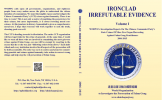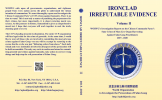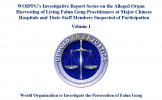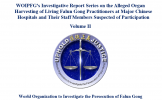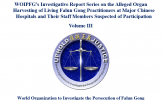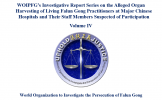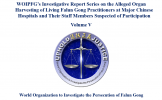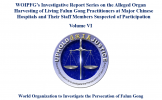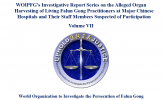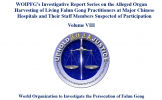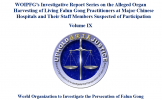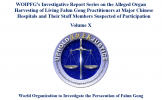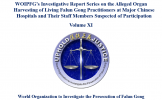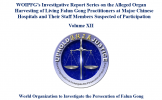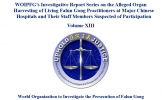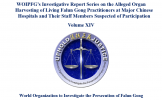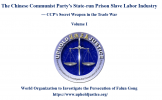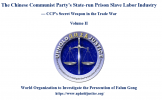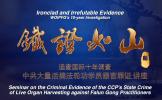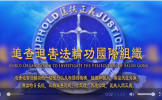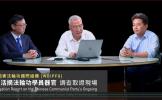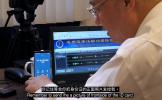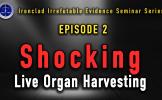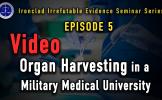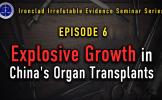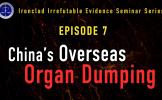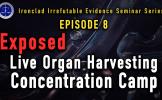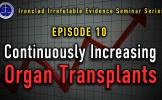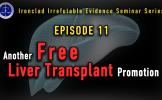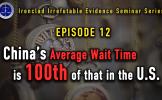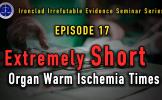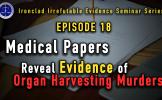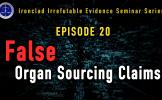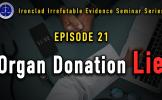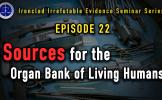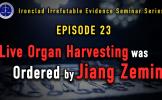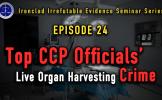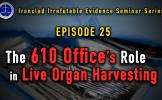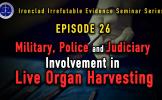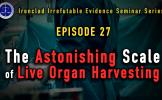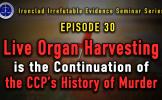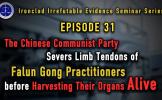Interviews by Huang Jiefu Provided New Evidence of China’s Organ Procurement from Prisoners of Conscience
In March 2015, China’s unofficial spokesperson on organ transplant, Huang Jiefu, gave multiple interviews in an attempt to promote China’s announcement of ending using prisoners’ organs. On the contrary, these interviews revealed more shocking evidence that China has been covering up its unethical organ procurement practice from prisoners of conscience.
This report provides excerpts and analysis of two interviews in March 2015.
March 13: “I have never seen the 1984 Regulation, how could you?”
On March 13, 2015, Huang Jiefu was asked to comment on the regulation enacted in 1984, which has been regarded as the official regulation on the usage of organs from executed prisoners in China.
The reporter made a comment that the Provisional Regulations on the Use of the Death Penalty Criminals or Cadaveric Organ of the Body of Criminals, which was enacted in 1984, has not been abolished today. Huang Jiefu questioned the reporter, “this provision is a secret, and I have not seen it before, why are you able to see it?”
Below is the original text in Chinese and its English translation. The entire interview in Chinese can be found here. It is archived here.
|
Translation: Huang Jiefu: Look to the future, the 1984 document is not a law, this provision is a secret, and I have not seen it before, why are you able to see it? That is not the law, at the state open level, on the government level, there has never been an acknowledgement that the use of organs from executed prisoners is legal, it is an embarrassing page, it is drinking poison to quench one’s thirst, it is expedient. Now we have the sunny system, why do you always want to abolish something? Who recognized the 1984 document? Original in Chinese: 记者:像之前大家都非常非常关注使用死囚器官这件事,也有不少评论提到1984年颁布的一个暂行规定《关于利用死刑罪犯尸体或尸体器官的暂行规定》,这个规定到现在为止还没有被宣布废止。 黄洁夫:看未来,1984年的文不是法,这个规定是秘密的,我也没有看到过,你们为什么能看到呢?那个不是法,国家在公开的层面上,在政府的层面上从来没有承认过利用死囚器官是合法的,那是难堪的一页,是饮鸩止渴,权宜之计。现在我们有阳光的,为什么老是要去废除什么呢?谁承认1984年的那个文件了? |
Although not a law, the 1984 regulation is the only basis to permit the use of executed prisoners' organs, and even Huang, the highest ranked official in China’s transplantation business hadn't seen it, the procurement of prisoners’ organsafter execution is obviously not legally regulated and thus should be consider unlawful in China.
March 16: Using prisoners organs a “filthy and forbidden area” caused by China’s former Security Czar
During the March 16, 2015 interview with Phoenix TV, Huang Jiefu mentioned that using prisoners’ organs has been a “filthy, intractable, sensitive and forbidden area.” Moreover, for the first time on record, he blamed Zhou Yongkang, now arrested Chinese security czar, for making the organ procurement from prisoners a profit chain. The entire interview in Chinese can be found here and the archived version here.
Below is the relevant content.
|
Translation: Xu Gehui (reporter with pro-Beijing Phoenix Television): In the midst of all this there must be every kind of entanglement, intertwining of interests, and a profit chain, so it would have become very filthy. Huang Jiefu: It became filthy, it became murky and intractable, it became an extremely sensitive, extremely complicated area, basically a forbidden area. Last year was the most crucial year. Huang Jiefu: 2014 was the transitional test period for Chinese organ transplantation. We really thank the Party Central State Council for having the kind of attitude and atmosphere. What was this atmosphere? Anti-corruption. If there was no “attacking the tigers and smashing the flies” (the so-called anti-corruption campaign), we wouldn't be here today abolishing the system (of taking organs from executed prisoners). You know what I'm saying? So the domestic and international environment, especially the climate of anti-corruption, clean government, that's the only way we were able to publicize this. XuGehui: Why, after attacking the big tiger, were you able to overturn this system of using executed prisoner organs? Who is this big tiger, after all? Huang Jiefu: It's just too clear. Everyone knows the big tiger. Zhou Yongkang is the big tiger; Zhou Yongkang was the chief of Political & Legal Affairs Committee, originally a member of the Politburo Standing Committee. Everyone knows this. There are newspapers every day talking about his background. So as for where executed prisoner organs come from, isn't it very clear? Actually, this work received the support from the previous General Secretary, Hu Jintao, and premier Wen Jiabao, and currently serving Xi Jinping and premier Li Keqiang's support. Otherwise we couldn't have done this. Original text in Chinese: 许戈辉:这中间肯定是有着千丝万缕的这种瓜葛、利益、利益链,所以它就会变得肮脏。 黄洁夫:变得肮脏,变得说不清道不明,变成了一个为什么特别敏感、特别复杂的区域,就是这个禁区,应该是去年是最关键的一年。 黄洁夫:2014年,是中国器官移植中间接受考验的一年,这个时候我们很感谢党中央国务院,有这样好的氛围,这种氛围是建立在什么?反腐败,没有这个打老虎、打苍蝇,就没有我们今天的宣布取消这个,明白我的意思了吗?所以这个是国际国内的环境,特别是我们国内反腐倡廉的大的气候,才能够使我们能够宣布这一点。 许戈辉:为什么打大老虎,就能把这个死囚器官这个事情,能够给推翻呢?这大老虎到底是指什么人啊? 黄洁夫:太清楚了,大老虎这个知道,周永康是大老虎,周永康是我们政法委书记,是这个原来的政治局常委,这个大家都知道的。这个报纸天天在这讲他的背景的。那这个死囚器官的来源在哪里,这不是很清晰了吗?实际上这件工作是得到了上一届的胡锦涛总书记和温家宝总理的支持,这一届得到了习主席跟克强总理的支持,不然是很难完成这件事情的。 |
What is worthy of noting is that the organ procurement from prisoners expanded under the leadership of Jiang Zemin, and has not been stopped by the subsequent two CCP leaders namely, the former General Secretary Hu Jintao, former Premier Wen Jiabao, current General Secretary Xi Jinping and current Premier Li Keqiang.
Huang indicated that if the “big tiger,” Zhou Yongkang, was not purged, ending the practice of using prisoners’ organs would not have happened. This raises the question: why would two generations of CCP leaders not have been able to stop Zhou Yongkang, an inferior ranking official, from taking organs from prisoners, and only his arrest would be considered a prerequisite to end it?
This infers that the inferior ranking Zhou Yongkang had knowledge about a practice that would give him the power to resist against his superiors. It suggests that not only convicted prisoners were used as organ source but also prisoners of conscience, which amounts to a larger number and a more predictable, steady organ pool than the convicted criminals.
The organ procurement from convicted, executed prisoners could not be ended for over a decade, because admitting executed prisoners as the organ source is to cover up the group of prisoners of conscience as the organ source.Therefore, the organ procurement from prisoners of conscience remains a pressing issue, which has never been admitted by the Chinese officials.


